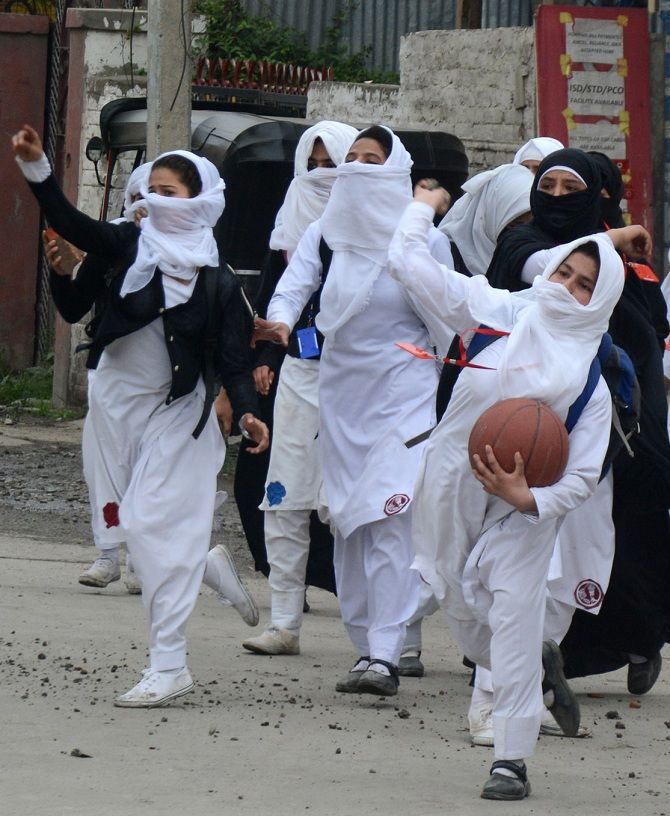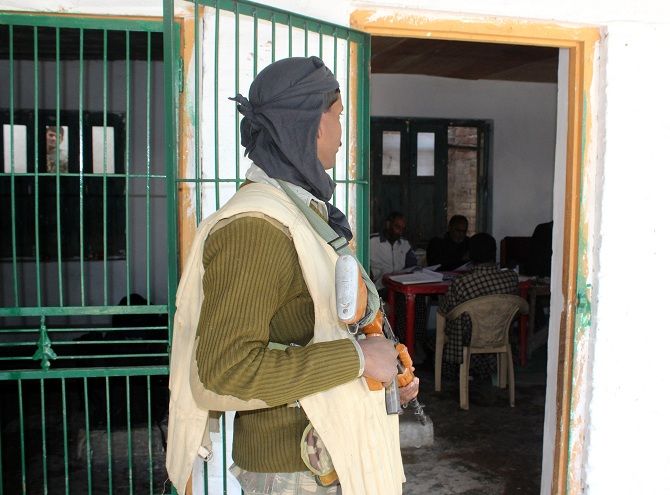The situation in the Kashmir valley is the vanguard action of global jihad, says Brigadier S K Chatterji (retd).
And in this battle, he believes, perception management operations are just as important as operations to neutralise the terrorists.

She was one of the many girl students who joined the violent protests against the alleged 'high handedness' of security forces at a college in Pulwama last month.
Photographs: Umar Ganie for Rediff.com
The 2014 elections in Jammu & Kashmir was a landmark event.
It was so, not because of the results the polls led to, but for the percentage of voters turning out to cast their vote. At 65.23 percent it was a spectacular achievement for the Indian State.
The defence establishment patted itself and the strategic community raced to claim that Kasmiris, including residents of the valley, had displayed their allegiance to the national flag.
J&K was on the path to mainstreaming with the Indian nation.
Post the elections the two major political parties emerged on top: The Jammu & Kashmir Peoples Democratic Party and the Bharatiya Janata Party.
The split between the Kashmir valley and the rest of the state was reflected truthfully in the poll results.
The PDP won just three seats in the Jammu region, which accounts for 37 assembly seats. The BJP garnered the highest percentage of votes, but in 33 out of the 34 seats that it contested in the Kashmir valley, its candidates lost their deposits.
Both parties displayed hither-to-fore not chanced upon prudence. Though they took over two months to come together, they ultimately formed a ministry.
Here was the PDP, a Kashmiri party perceived as a hardliner and often accused of having a sympathetic connect with the militant groups, and the right of centre BJP, equally often viewed as a hardline Hindutva protagonist establishment, marrying up.
The optimism the marriage generated was infectious for many and shocking for many more.
Also read: The lost generations of the Kashmir valley
- The unpredictable consequences of Burhan Wani's death
- 'Kashmiri youth have become the face of violence'
- Keeping Kashmir, but losing Kashmiris
As the clock has ticked by, somewhere it seems to have gone all very wrong. We started witnessing the Kashmiri's disenchantment with the government.
In the recent by-election in Srinagar just over 7 percent voters exercised their franchise.
Why have so many in Kashmir turned away from the polling booths?
Though there were enough calls to boycott the polls in 2014, no one pelted stones at the polling booths. How is it that without an obvious fresh stimulus the situation has flared up to a boil?
Perhaps, the most important issue is the PDP losing political space and the National Conference not quite being able to occupy that space.
For the PDP's supporters, marrying up with the BJP was simply not the expected strategy. The resultant vacuum created now echoes with separatist calls and appeals of the tanjeems to the younger lot to join the terrorist ranks.
During this phase, the Hijbul Mujahedeen, a primarily indigenous terrorist group, was also able to find Burhan Wani. This handsome young man with his sleek AK-47 was soon propelled by HM media managers as the poster boy of terrorism.
Unfortunately, the security forces either could not or did not neutralise him early enough. He graduated to being a youth icon of sorts, bringing back to those narrow by-lanes of Srinagar the romance associated with terrorists.
These lanes are also dank and filthy enough to allow no youthful dreams to blossom. A la Burhan Wani option was the one hope out of the rot.
For those Kashmiris who awaited good governance post the elections, neither jobs nor development was the experience.
It's rare to find a member of the family of a Kashmiri in a government job joining a terrorist outfit, and definitely not so if the individual is in the armed forces.
Terrorism in Kashmir also needs to be studied more from the viewpoint of it being the 'business of terrorism' rather than terrorism per se. It's an industry where the beneficiaries populate the full spectrum from the common man to the political leadership.
As the terror level rises, so does Delhi's funding. And the money flows into a multitude of pockets rather than projects which could have generated jobs and ushered development.

In the Srinagar Lok Sabha by-election, just over 7 percent voters exercised their franchise -- a steep fall from the landmark 2014 assembly election in the state.
The other force that increasingly influences activities in Kashmir is the outreach of global jihad.
Stone throwing does not trace its origin to Kashmir. Without going too far deep in to history, Gaza, the area that witnessed the first intifada, has been the arena for enough of it.
Stone throwing also has a symbolic connotation.
The Islamic State's flag has not been too uncommon a sight in the Kashmir valley, of late. With the IS staging a rear guard action in Syria and Iraq, it's time for its cadre to find new bases.
Afghanistan and Pakistan are attractive proposals. Pakistan would provide the wherewithal only if they are ready to operate in India.
The stone throwing that we are witnessing has a connect and is the vanguard action of global jihad in Kashmir, facilitated by Pakistan.
The situation was now ripe for the experts located beyond the Line of Control to transform the disenchantment of the locals into focussed anti-State activity with mass participation.
The mass participation was necessary for the audience abroad to perceive it as an outburst of Kashmiris rather than another Pakistan orchestrated sequel.
Kashmir has witnessed stone throwing in the past. The entire activity is undertaken by a fairly well-oiled machinery.
There are those who muster the crowds, those who provide the stones and those who throw them. Everyone gets compensated.
In fact, in the valley, even in the terrorist ranks, every individual is paid. There is not much love lost for the cause.
Most people fully comprehend the fact that it is impossible for the valley to survive like an independent State. They realise that the terrorists from across the LoC would take over the very next day and impose Sharia, which is not in consonance with the liberal Kashmiri culture.
As far as a merger with Pakistan is concerned, there is hardly an individual in the valley who is keen on it.
The crowds are brought together by the use of social media and also the public address systems in shrines. A stage has been reached when stone throwing is inevitably undertaken when an operation is launched in a village to neutralise terrorists.
When a few civilians die in the bargain, there funerals are occasions to whip up more passion.
The cycle of violence and rising passions is thus maintained.
Also read: Of war and peace
- 'When we don't talk to Kashmiris, Pakistan becomes more relevant'
- 10 actions which may cool down Kashmir
- 'Kashmir is a battle of the mind'
The situation, however, is neither hopeless nor irreversible.
We have faced repeated downturns in Kashmir and have equally often retrieved the situation.
The first requirement is to neutralise the leadership with intelligence driven operations.
Such operations have to be continuously pursued to create enough fear to deter individuals in the terrorist outfits from accepting leadership roles.
Separatist leaders have to also be denied access to the population.
The use of force in such a phase will need to be governed by operational requirements rather than be dictated by political expediency.
There is also a need to build intelligence capabilities, especially human intelligence resources.
The central and state police forces have also to operate with required aggression rather than shun use of force at the cost of losing face and also their deterrence value.
Governance has to improve. A degree of probity must be visible in public life.
Jobs have to be created and the restive youth offered a better option.
The issue of jobs is perhaps the most urgent issue. We have been recruiting Kashmiri youth into the armed and police forces. Additional vacancies could be mandated for J&K immediately.
We are losing the perception management battle to the tanjeems.
They are using all forms of media to continuously vilify the government and the security forces. Their narrative is the prevailing influence.
Our influence operations have to overwhelm their narrative with professionally crafted messages and audio visuals. These messages have also to reach Kashmiris of all shades.
The perception management plans need to be long term.
Such operations are as important as operations to neutralise terrorists. Operations and perception management need to be run concurrently and in sync with each other.
Finally, to quote Shailendra Aima, a Kashmiri intellectual and editor of the Kashmir Sentinel, 'If the will and writ of the State dithers in any territory, the enemy and the anarchists benefit.'
The political establishments, both in Srinagar and Delhi, have to be firmer with dissidents.
A secular country cannot display unending tolerance to dissidence based on religion. It's a sign of weakness; not an example of upholding democratic values.
Please scroll down for more insights into the Kashmir dilemma.










